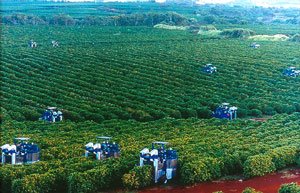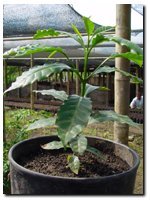Soil in Context
 I'm currently reading the classic text on Organic farming called (interestingly enough) Organic Farming edited by Ray Wolf from Rodale Press. The thing that has been striking me the most is the dichotomy of views on soil health between commercial and organic faming techniques.
I'm currently reading the classic text on Organic farming called (interestingly enough) Organic Farming edited by Ray Wolf from Rodale Press. The thing that has been striking me the most is the dichotomy of views on soil health between commercial and organic faming techniques.Commercial agriculture looks at farming strictly in terms of nutrient inputs and crop yields by weight. The idea of facilitating a plant's ability to grow in-health so that it will provide a crop in return has been all but forgotten in the 'modern' ag industry. Plants are supplied with the nutrients they require, not from the soil itself but from carefully (sometimes) proportioned application of raw chemical foods added directly to the plants. This method focuses solely on the plant itself and takes little or no account of the health of the soil.
In an average organically farmed acre of land there is 11 tons of living material (worms, fungus, nematodes, bacteria,etc.). An acre of chemically farmed land can have as little as 2 tons. Obviously, commercial agriculture throws off the natural balance of the ecosystem IN the soil.
What does this mean for the operation of the farm? Typically it creates the need for more chemical application in order to compensate for the lack of nutrients being created (no new humus being added). And so the vicious cycle begins. After years, the soil cannot support the crops and more and more chems. must be added to get the yields required to pay, not only for general production costs, but for the expensive fertilizers and pesticides that the farm is now dependent on. Not too sustainable huh?

When you look at crops as units that need 'such and such' amount of nitrogen and 'xyz' amount of whatever chemical, the RELATIONSHIP between the grower and the grown is severed into a onesided project with no communication between the farmer and the flux of the process of growing itself. The result is that the context of farming has disappeared or become a barren shell. The soil shares the same fate. The earth into which a plant is placed becomes nothing better than a plastic pot.
This same mentality, tragically finds its way into the rest of the coffee industry as well. It is often seen in the coffee roasting world. Many coffee roasters see their beans as units to be 'applied' to their roaster (machine). The advent of 'profile roasting' has been a wonderful boost to the craft of roasting. But while providing highly valuable 'navigation' tools, it has also provided an opportunity for some roaster's to believe that they can completely quantify the roasting process. "X bean grown at Y altitude from Z cultivar with 12.34% moisture and whatever density, ALWAYS means drop at this time and cut heat here and here.......... "
Is the relationship gone? If a roaster denies that there is something ineffable, esoteric, even mystical in the craft of roasting coffee have they lost their way?
This same mentality, tragically finds its way into the rest of the coffee industry as well. It is often seen in the coffee roasting world. Many coffee roasters see their beans as units to be 'applied' to their roaster (machine). The advent of 'profile roasting' has been a wonderful boost to the craft of roasting. But while providing highly valuable 'navigation' tools, it has also provided an opportunity for some roaster's to believe that they can completely quantify the roasting process. "X bean grown at Y altitude from Z cultivar with 12.34% moisture and whatever density, ALWAYS means drop at this time and cut heat here and here.......... "
Is the relationship gone? If a roaster denies that there is something ineffable, esoteric, even mystical in the craft of roasting coffee have they lost their way?
If soil health is the context in which a plant grows what is the equilvalent context in which a bean is roasted?
Profiling, record keeping, research, logging, charting, graphing, input, output. All of these things can help create the ultimate quality coffee (on the farm or in the roaster) but they must be used to facilitate the relationship-the interaction-the process. The science should serve the craft; the craft should not serve the science.
links:
one two three

1 Comments:
Dude -- I heart yr blog, but I have to be honest and say I don't stop by that often cuz -- without an easily accessible RSS feed -- it just slips my mind. Do you have an RSS feed? If so, mind sending me the deets? greenlagirl@gmail.com.
Happy caffeinating ;)
Post a Comment
<< Home